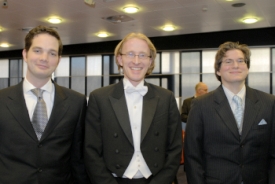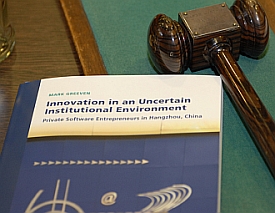Private Software Entrepreneurs in Hangzhou, China
Mark Greeven has defended his PhD thesis entitled “<link erim events _blank>Innovation in an Uncertain Institutional Environment: Private Software Entrepreneurs in Hangzhou, China”, on April 2. The thesis provides insights that can be used by foreign firms contemplating to enter China in one way or the other, Chinese entrepreneurs in high-tech sectors and policy makers inside and outside of China.
 An important result of the thesis is that foreign firms should not only consider China as a factory of the world but as a potential partner in joint innovative activities. The thesis shows that Chinese entrepreneurs are innovative and creative in a variety of ways, even in high-tech sectors such as software. At the same time, Greeven warns foreign firms to be aware of alternative mechanisms of protecting innovations in China such as extensive local embeddedness via local partnerships and the development of organization specific capabilities.
An important result of the thesis is that foreign firms should not only consider China as a factory of the world but as a potential partner in joint innovative activities. The thesis shows that Chinese entrepreneurs are innovative and creative in a variety of ways, even in high-tech sectors such as software. At the same time, Greeven warns foreign firms to be aware of alternative mechanisms of protecting innovations in China such as extensive local embeddedness via local partnerships and the development of organization specific capabilities.
A second important result is that Chinese entrepreneurs should consider the value added of developing and commercializing non-technical innovations to exploit the opportunities of an emerging market while at the same time developing a sustainable and coherent set of innovative capabilities. Moreover, Chinese entrepreneurs are advised to focus on developing a set of capabilities that gives the firm a long term competitive advantage for innovation in a particular sector, instead of following opportunistic, short term strategies to exploit ‘chances of the day’, shifting attention across sectors.
 About Mark Greeven:
About Mark Greeven:
Mark J. Greeven (Schiedam, September 4, 1981) obtained his MSc degree in Business Administration from Erasmus University, The Netherlands. He became a PhD candidate at the Department of Organization and Personnel Management, Rotterdam School of Management, Erasmus University in 2004.
Mark Greeven has spent considerable time in Hangzhou, China for doing PhD field work in cooperation with Chinese entrepreneurs and the School of Management at Zhejiang University. Furthermore, he was a visiting professor at the National Institute for Innovation Management of Zhejiang.
He has presented his work at major international and Chinese conferences such as EGOS, SASE, ISMOT, CICALICS, and IACMR and held seminars at famous Chinese universities including Zhejiang University, Fudan University and Qinghua University.
He has published his work in book chapters with Edward Elgar, Springer, and international academic journals such as European Management Journal. Currently, he is working on a special issue article for Management and Organization Review. In addition to publishing in academic outlets, he frequently appears in the Dutch media such as De Volkskrant, Trouw, RTL-Z, and Chinese Radio and TV). Mark Greeven is currently an assistant professor at Rotterdam School of Management, Erasmus University, member of the RSM Research Centre on China Business, and academic coordinator of a new master programme Chinese Economy and Business.
Abstract:
The thesis deals with innovation and entrepreneurship in China. Despite an institutional environment characterized by high levels of uncertainty, innovation thrives even in the technology-based sectors. The research asks for explanations how innovative capabilities are developed in such an adverse institutional environment. For analyzing the institutional environment the research relies on comparative institutional approaches while approaches from the capabilities and resource-based theories, innovation management and China studies are used for explaining the behaviour of firms. The thesis is based on 2 years of extensive field research in cooperation with 45 Chinese entrepreneurs and Zhejiang University in Hangzhou. The findings suggest that Chinese entrepreneurs develop particular innovative capabilities in response to particular technical, market and institutional opportunities and constraints. One of the key insights is that innovation, in a broad understanding, can take place in an environment with institutional uncertainty and limited formal protection of intellectual property rights. On the one hand, institutional uncertainty creates both restrictions and incentives for innovation, and, on the other hand, firms are able to develop specific innovative capabilities that manage sectoral constraints while fighting off institutional constraints.
More Information
Pictures of the Defense
Full Text of the Dissertation


